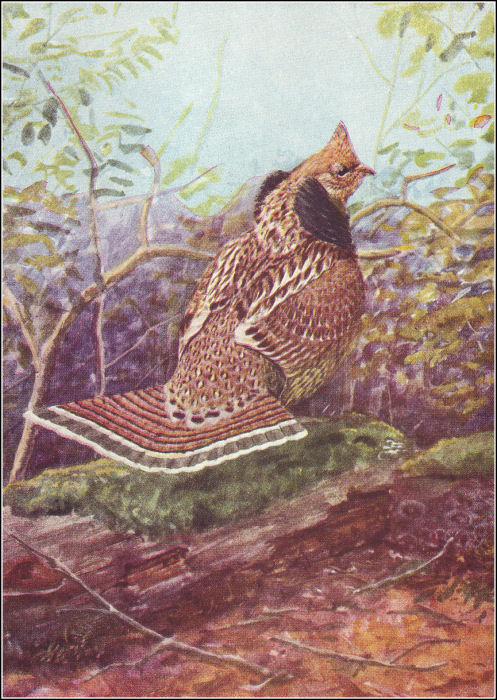Uncle Remus—His Songs and His Sayings by Joel Chandler Harris
How Mr. Rabbit Lost His Fine Bushy Tail
"One
time," said Uncle Remus, sighing heavily and
settling himself back in his seat with an air of
melancholy resignation—"one time Brer Rabbit wuz
gwine 'long down de road shakin' his big bushy tail, en
feelin' des ez scrumpshus ez a bee-martin wid a fresh
bug." Here the old man paused and glanced at the little
boy, but it was evident that the youngster had become
so accustomed to the marvelous developments of Uncle
Remus's stories, that the extraordinary statement made
no unusual impression upon him. Therefore the old man
began again, and this time in a louder and more
insinuating tone:
"One time ole man Rabbit, he wuz gwine 'long down de
road shakin' his long, bushy tail, en feelin' mighty
biggity."
This was effective.
"Great goodness, Uncle Remus!" exclaimed the little boy
in open-eyed wonder, "everybody knows that rabbits
haven't got long, bushy tails."
The old man shifted his position in his chair and
allowed his venerable head to drop forward until his
whole appearance was suggestive of the deepest
dejection; and this was intensified by a groan that
seemed to be the result of great mental agony.
Finally he spoke, but not as addressing himself to the little
boy.
"I notices dat dem fokes w'at makes a great 'miration
'bout w'at dey knows is des de fokes w'ich you can't
put no 'pennunce in w'en de 'cashun come up. Yer one un
um now, en he done come en excuse me er 'lowin dat
rabbits is got long, bushy tails, w'ich goodness knows
ef I'd a dremp' it, I'd a whirl in en on-dremp it."
"Well, but Uncle Remus, you said rabbits had long,
bushy tails," replied the little boy. "Now you know you
did."
"Ef I ain't fergit it off'n my mine, I say dat ole Brer
Rabbit wuz gwine down de big road shakin' his long,
bushy tail. Dat w'at I say, en dat I stan's by."
The little boy looked puzzled, but he didn't say
anything. After a while the old man continued:
"Now, den, ef dat's 'greed ter, I'm gwine on, en ef
tain't 'greed ter, den I'm gwineter pick up my cane en
look atter my own intrust. I got wuk lyin' 'roun' yer
dat's des natchully gittin' moldy."
The little boy still remained quiet, and Uncle Remus
proceeded:
"One day Brer Rabbit wuz gwine down de road shakin' his
long, bushy tail, w'en who should he strike up wid but
ole Brer Fox gwine amblin' long wid a big string er
fish! W'en dey pass de time er day wid wunner nudder,
Brer Rabbit, he open up de confab, he did, en he ax
Brer Fox whar he git dat nice string er fish, en Brer
Fox, he up'n 'spon' dat he kotch um, en Brer Rabbit, he
say whar'bouts,
en Brer Fox, he say down at de
babtizin' creek, en Brer Rabbit he ax how, kaze in dem
days dey wuz monstus fon' er minners, en Brer Fox, he
sot down on a log, he did, en he up'n tell Brer Rabbit
dat all he gotter do fer ter git er big mess er minners
is ter go ter de creek atter sundown, en drap his tail
in de water en set dar twel day-light, en den draw up a
whole armful er fishes, en dem w'at he don't want, he
kin fling back.
"Right dar's whar Brer Rabbit drap his watermillion,
kaze he tuck'n sot out dat night en went a fishin'. De
wedder wuz sorter col', en Brer Rabbit, he got 'im a
bottle er dram en put out fer de creek, en w'en he git
dar he pick out a good place, en he sorter squot down,
he did, en let his tail hang in de water. He sot dar,
en he sot dar, en he drunk his dram, en he think he
gwineter freeze, but bimeby day come, en dar he wuz. He
make a pull, en he feel like he comin' in two, en he
fetch nudder jerk, en lo en beholes, whar wuz his
tail?"
There was a long pause.
"Did it come off, Uncle Remus?" asked the little boy,
presently.
"She did dat!" replied the old man with unction. "She
did dat, and dat w'at make all deze yer bob-tail
rabbits w'at you see hoppin' en skaddlin' thoo de
woods."
"Are they all that way just because the old Rabbit lost
his tail in the creek?" asked the little boy.
"Dat's it, honey," replied the old man. "Dat's w'at dey
tells me. Look like dey er bleedzd ter take atter der
pa."
|
